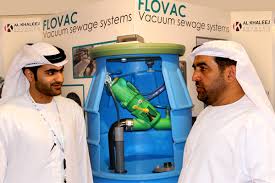In the realm of wastewater management, innovation continues to drive the evolution of sewerage systems. Among the emerging technologies, Flovac vacuum sewerage systems have garnered attention for their efficiency, sustainability, and adaptability. This article explores the key features, advantages, and applications of Flovac vacuum sewerage systems, highlighting how this technology is revolutionizing the way communities manage their wastewater.
Understanding Flovac Vacuum Sewerage Systems:
Flovac vacuum sewerage systems operate on a fundamentally different principle than traditional gravity-based systems. Instead of relying on the force of gravity to transport wastewater, Flovac systems use vacuum technology to create a pressure differential that moves sewage from individual collection points to a central vacuum station. This innovative approach offers several distinct advantages over conventional sewerage systems.
Key Features of Flovac Vacuum Sewerage Systems:
- Collection Pits: Flovac systems employ collection pits or vacuum interface chambers at individual properties to receive and store wastewater. These pits are equipped with automatic valves that open when a predetermined level of wastewater is reached.
- Vacuum Mains: Vacuum mains are a network of pipes that connect the collection pits to the central vacuum station. These mains design to operate under partial vacuum conditions, allowing them to transport wastewater efficiently and with minimal energy consumption.
- Central Vacuum Station: The central vacuum station is a key component where the vacuum is generated. It serves as a centralized point for collecting and transporting wastewater from multiple collection points. The station uses vacuum pumps to create the necessary pressure differential.
- Remote Monitoring and Control: Flovac systems often incorporate advanced control and monitoring technologies. Remote monitoring allows operators to assess the performance of the system in real time, enabling proactive maintenance and efficient management of the sewerage network.
Advantages of Flovac Vacuum Sewerage Systems:
- Cost-Effectiveness: Flovac systems can be more cost-effective than traditional gravity-based systems, especially in challenging terrains or areas with low population density. The reduced need for extensive excavation and fewer materials contribute to overall cost savings.
- Adaptability to Topography: One of the notable advantages of Flovac systems is their adaptability to varying topographies. Vacuum sewerage systems can navigate hills, valleys, and other challenging landscapes more easily than gravity systems, offering greater flexibility in urban planning.
- Reduced Environmental Impact: Flovac systems are designed to be environmentally friendly. The reduced excavation requirements result in less disruption to the natural landscape, and the systems can installed with minimal impact on flora and fauna. Additionally, the vacuum technology consumes less energy compared to traditional systems.
- Quick Installation and Expansion: The installation process for Flovac systems is generally quicker than that of gravity systems. The modular nature of the technology also allows for easier expansion, making it suitable for growing communities or areas experiencing rapid development.
- Efficient Sewage Transportation: The vacuum technology used in Flovac systems enables efficient and rapid sewage transportation. The vacuum created in the system ensures a consistent flow. Minimizing the risk of blockages and allowing for the transportation of sewage over longer distances.
- Reduced Odor Issues: Due to the vacuum conditions within the system, the likelihood of foul odors escaping is minimized. The closed nature of the vacuum sewerage system prevents the release of unpleasant smells, contributing to a more pleasant urban environment.
Applications of Flovac Vacuum Sewerage Systems:
- Urban Developments: Flovac systems are particularly well-suited for new urban developments where efficient wastewater management is crucial. Their adaptability to different terrains and cost-effectiveness make them an attractive option for modern urban planning.
- Retrofitting Existing Systems: In some cases, Flovac vacuum sewerage systems can be retrofitted into existing gravity-based systems. This adaptability allows municipalities to modernize their wastewater infrastructure without a complete overhaul.
- Remote and Challenging Environments: The efficiency and adaptability of Flovac systems make them suitable for deployment in remote areas or locations with challenging topographies where traditional gravity systems may be impractical.
Conclusion:
Flovac vacuum sewerage systems represent a paradigm shift in wastewater management, offering a range of advantages that align with the demands of modern urbanization and environmental sustainability. As communities worldwide seek innovative solutions for efficient sanitation. The adaptability, cost-effectiveness, and reduced environmental impact of Flovac technology position. It is a promising contender in the evolution of sewerage systems. Embracing such innovations is key to building resilient, sustainable, and efficient urban environments for the future.

